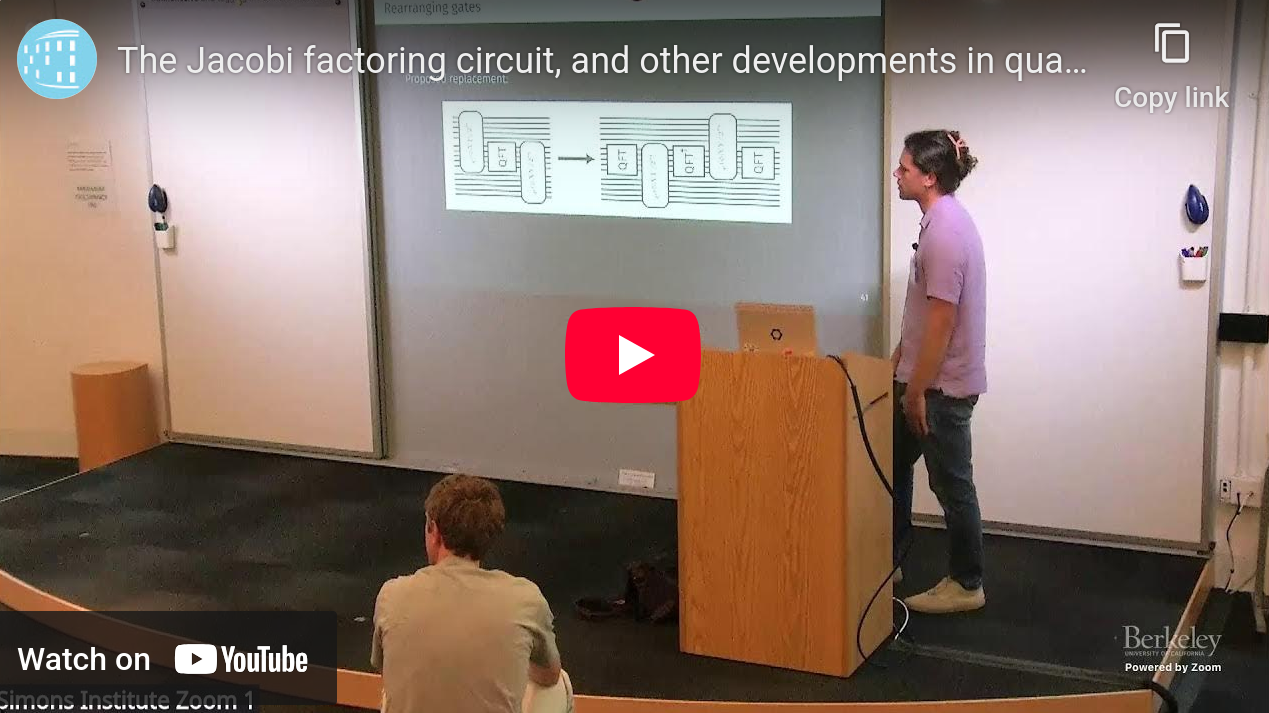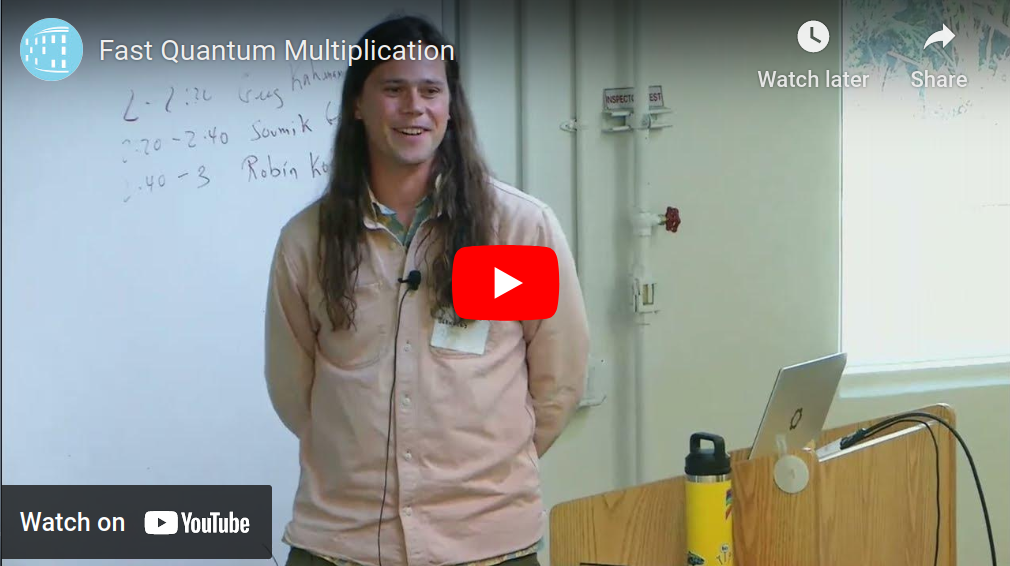
Greg Meyer
also known as: Greg Kahanamoku-Meyer
Research directions
Recently I have been focused on reducing the cost of quantum algorithms for factoring and related tasks, both by reducing the cost of basic subroutines like multiplication and the quantum Fourier transform; and by making improvements at the algorithmic level like streaming to reduce qubit counts to even less than the length of the classical input, and using measurement tricks to more efficiently compute irreversible functions on a quantum computer.
I also work on making, breaking, and analyzing proofs of quantumness—protocols by which a resource-constrained quantum device can convince a skeptical classical verifier that it is indeed doing something quantum.
I also love high-performance (classical) parallel computing; I wrote and maintain the dynamite library, which accelerates the numerical study of quantum many-body spin chain physics using MPI and GPUs. In graduate school I used dynamite to explore unusual phenomena including time crystals and black hole physics. I have also used GPUs to accelerate tasks related to cryptography; for some time I held a record for having solved the largest instances of the Learning Parity with Noise problem used in post-quantum cryptography.


Outreach & equity
As a postdoc, I volunteer with the following program:
QuERY: Quantum Engineering Research and You
Joint Harvard-MIT program mentoring high school students in Bellaire, TX about various subfields of quantum science, as well as generally about finding your path in science and life.
During graduate school, I was involved with the following organizations:
IGenSpectrum
Student group for the LGBTQ+ community in Berkeley Physics. I served as an officer.
Respect is Part of Research
Annual workshop aimed at improving department climate and preventing sexual violence and sexual harassment. I served each year as a facilitator, and helping to organize the workshop.
Bay Area Scientists in Schools
Teaching science lessons to elementary school students around the Bay Area. I participated as a teacher, and a member of the Steering Committee.
Please contact me or follow the links above if you're interested in getting involved with any of these organizations!
Talks and presentations
If you would like me to speak, feel free to contact me!
2025-11-13, Simons Institute for the Theory of Computing.
Quantum pod seminar.
"Parallel spooky pebble games for factoring and more." (1 hr)
2025-10-15, Tufts University.
Quantum Computing Seminar.
"The Optimistic Quantum Fourier Transform." (1 hr)
2025-09-18, Tufts University.
Quantum Computing Seminar.
"The Jacobi Factoring Circuit." (1 hr)
2025-06-26, ACM Symposium on Theory of Computing.
"The Jacobi Factoring Circuit: Quantum Factoring in Near-Linear Gates and Sublinear Space." (18 min)
2025-05-26, Simons Institute for the Theory of Computing.
Quantum Algorithms, Complexity, and Fault Tolerance Reunion Workshop.
"The Jacobi factoring circuit, and other developments in quantum factoring." (1 hr) [slides] [video]
2025-05-23, University of California San Diego, Computer Science & Engineering.
Theory lunch seminar.
"Recent advances in quantum factoring." (1 hr)
2025-05-02, University of Washington, Computer Science & Engineering.
Theory lunch seminar.
"Recent advances in quantum factoring." (1 hr)
2025-02-27, QIP 2025.
"Factoring in near-linear depth using 2n+O(n/log n) qubits." (poster)
2024-11-19, IBM Quantum.
Guest seminar.
"The Jacobi factoring circuit: classically-hard factoring in sublinear quantum space and depth." (1 hr) [slides]
2024-10-03, MIT Quantum Information Science group.
Quantum Information Processing Seminar.
"Factoring in near-linear depth with roughly 2n qubits." (1 hr)
2024-09-27, Harvard University.
Yao group meeting.
"The pursuit of a free lunch: factoring in low depth with few qubits." (2 hr)
2024-09-11, University of Maryland.
QuICS seminar.
"Achieving low circuit depth with few qubits, for arithmetic and the QFT." (1 hr)
2024-05-16, Google Quantum AI.
Qualtran group meeting.
"Fast integer multiplication without ancillas." (1 hr) [slides]
2023-11-02, University of Hawaiʻi at Mānoa, Department of Physics and Astronomy.
Department colloquium.
"How to prove you have built a quantum computer." (1 hr) [slides]
2023-10-26, Google Quantum AI.
Seminar.
"Fast integer multiplication with very few ancillas." (1 hr) [slides]
2023-10-25, Caltech Institute for Quantum Information and Matter.
IQIM seminar.
"Fast integer multiplication with very few ancillas." (1 hr.) [slides]
2023-10-20, MIT Quantum Information Science group.
Quantum Information Processing Seminar.
"Fast quantum integer multiplication with very few ancillas." (1 hr) [slides]
2023-10-19, Harvard University.
Quantum information seminar.
"Fast quantum integer multiplication with very few ancillas." (1 hr) [slides]
2023-07-14, Simons Institute Summer Cluster Workshop.
Lightning talk.
"Fast integer multiplication with almost no ancillas." (20 min) [slides] [video]
2023-03-01, IBM Quantum.
Guest seminar.
"Cryptographic protocols for classically-verifiable quantum advantage and more." (1 hr) [slides]
2022-08-04, CLEAR Project.
PubScience.
"Quantum computing: how to do math with atoms, and how to trust the answers" (1 hr) [slides]
2022-05-03, UC Berkeley.
Guest lecture, CHEM 195/295: Special topics in Quantum Computing.
"Classical verification of quantum computation." (1.5 hr) [slides]
2022-03-15, APS March Meeting.
Quantum Digital and Analog Algorithms [Focus] (invited).
"Classical verification of quantum computational advantage." (30 min) [slides]
2022-02-22, Harvard University.
CMT Kid's Seminar.
"Classical verification of quantum computational advantage." (1 hr) [slides]
2022-02-09, Quantum Systems Accelerator (QSA).
Science session.
"Classical verification of quantum computational advantage." (15 min) [slides]
2021-11-10, IBM Quantum.
Quantum computing seminar.
"Classical verification of quantum computational advantage." (1 hr) [slides]
2021-10-08, MIT cryptography and information security.
CIS seminar.
"Classical verification of quantum computational advantage." (1.5 hr) [slides]
2021-09-29, NSF Challenge Institute for Quantum Computation (CIQC).
Colloquium introduction.
"Computability and complexity (introducing Jarrod McClean)." (20 min) [video]
2021-09-28, Physics of Information and Quantum Technologies, IT Lisbon.
Group meeting.
"Classical verification of quantum computational advantage." (45 min)
2021-07-14, Simons Institute for the Theory of Computing.
Quantum Wave in Computing Reunion.
"Classical verification of quantum computational advantage." (45 min) [video]
2021-05-21, MIT Quantum Information Science group.
Quantum Information Processing Seminar.
"Classical verification of quantum computational advantage." (45 min)
2021-04-26, UT Austin quantum information center.
Group meeting.
"Classical verification of quantum computational advantage." (45 min)
2021-04-23, AIDE-QC.
All hands meeting.
"Classical verification of quantum computational advantage." (20 min)
2021-04-21, Quantum Systems Accelerator (QSA).
Science session.
"Classical verification of quantum computational advantage." (15 min)
2021-02-01, Quantum Information Processing (QIP 2021).
"An efficiently-verifiable test of quantum advantage." (poster)
2020-08-26, AIDE-QC.
Verification and debugging thrust meeting.
"Efficiently-verifiable quantum advantage."
2020-06-02, APS DAMOP 2020.
"An efficiently-verifiable test of quantum advantage." (poster)
2019-05-30, APS DAMOP 2019.
"A numerical study of many-body localization using LOBPCG." (poster)
2018-03-08, APS March Meeting 2018.
"A long range, pre-thermal time crystal in one dimension." (15 min)
2017-06-07, APS DAMOP 2017.
"Simulation of quantum many-body dynamics for generic strongly-interacting systems." (poster)
Papers
See my page at Google Scholar
GDKM = Gregory D. Kahanamoku-Meyer
† = authors in alphabetical order
PhD dissertation
GDKM. Exploring the Limits of Classical Simulation: From Computational Many-Body Dynamics to Quantum Advantage. Ph.D. dissertation, University of California at Berkeley, 2023 [link]
Articles
† GDKM, S. Ragavan, K. Van Kirk. Parallel Spooky Pebbling Makes Regev Factoring More Practical. arXiv:2510.08432 [arxiv] [eprint]
GDKM, J. Blue, T. Bergamaschi, C. Gidney, I. Chuang. A log-depth quantum Fourier transform that rarely needs ancillas. arXiv:2505.00701 [arxiv]
† GDKM, S. Ragavan, V. Vaikuntanathan, K. Van Kirk. The Jacobi Factoring Circuit: Quantum Factoring with Near-Linear Gates and Sublinear Space and Depth. STOC 2025. [arxiv] [eprint] [conf. proceedings]
GDKM, N. Yao. Fast quantum integer multiplication with zero ancillas. arXiv:2403.18006 [arxiv]
GDKM. Forging quantum data: classically defeating an IQP-based quantum test. Quantum 7, 1107 (2023) [arxiv + journal]
† Z. Brakerski, A. Gheorghiu, GDKM, E. Porat, T. Vidick. Simple Tests of Quantumness Also Certify Qubits. CRYPTO 2023 [arxiv] [conf. proceedings]
GDKM*, D. Zhu*, L. Lewis, C. Noel, O. Katz, B. Harraz, Q. Wang, A. Risinger, L. Feng, D. Biswas, L. Egan, A. Gheorghiu, Y. Nam, T. Vidick, U. Vazirani, N. Yao, M. Cetina, C. Monroe. Interactive cryptographic proofs of quantumness using mid-circuit measurements. Nat. Phys. 19, 1725–1731 (2023) [arxiv] [journal]
* Co-first-authored paper
GDKM, S. Choi, U. Vazirani, N. Yao. Classically-verifiable quantum advantage from a computational Bell test. Nat. Phys. 18, 918–924 (2022) [arxiv] [journal]
R. Van Beeumen, K. Ibrahim, GDKM, N. Yao, C. Yang. Enhancing scalability of a matrix-free eigensolver for studying many-body localization. The International Journal of High Performance Computing Applications, 36(3), 307–319 (2022) [arxiv] [journal]
B. Kobrin, Z. Yang, GDKM, C. Olund, J. Moore, D. Stanford, N. Yao. Many-Body Chaos in the Sachdev-Ye-Kitaev Model. Phys. Rev. Lett. 126, 030602 (2021) [arxiv] [journal]
F. Machado, D. Else, GDKM, C. Nayak, N. Yao. Long-Range Prethermal Phases of Nonequilibrium Matter. Phys. Rev. X 10, 011043 (2020) [arxiv] [journal]
R. Van Beeumen, GDKM, N. Yao, C. Yang. A scalable matrix-free iterative eigensolver for studying many-body localization. HPCAsia2020: Proceedings of the International Conference on High Performance Computing in Asia-Pacific Region (2020) [conf. proceedings]
F. Machado, GDKM, D. Else, C. Nayak, N. Yao. Exponentially Slow Heating in Short and Long-range Interacting Floquet Systems. Phys. Rev. Research 1, 033202 (2019) [arxiv] [journal]
Peer review
Publications and conferences for which I have reviewed papers include PRX, PRX Quantum, npj Quantum Information, QIP, QCE, TQC, ITCS, and QCTIP.
About me
I grew up in Vermont, and enjoy bouldering, Ultimate, hockey, and generally being outdoors.
My familial roots are German and Czech; I have varying levels of proficiency in French, Spanish, German, and Hawaiian (in addition to my native language English).

Copyright © 2018 Gregory D. Meyer | Design based off of "Magazee" by Template Mo


